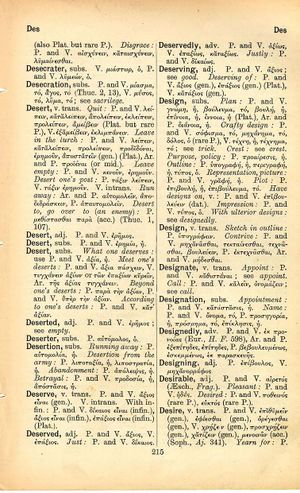designate: Difference between revisions
From LSJ
Τίς, ξένος ὦ ναυηγέ; Λεόντιχος ἐνθάδε νεκρὸν εὗρέ σ᾿ ἐπ᾿ αἰγιαλοῦ, χῶσε δὲ τῷδε τάφῳ, δακρύσας ἐπίκηρον ἑὸν βίον· οὐδὲ γὰρ αὐτὸς ἥσυχος, αἰθυίῃ δ᾿ ἶσα θαλασσοπορεῖ. → Who art thou, shipwrecked stranger? Leontichus found thee here dead on the beach, and buried thee in this tomb, weeping for his own uncertain life; for he also rests not, but travels over the sea like a gull.
(CSV3) |
(6_5) |
||
| Line 5: | Line 5: | ||
<b class="b2">Call</b>: P. and V. καλεῖν, ὀνομάζειν; see [[call]]. | <b class="b2">Call</b>: P. and V. καλεῖν, ὀνομάζειν; see [[call]]. | ||
}} | |||
{{Lewis | |||
|lshtext=<b>dēsignātē</b>: adv. [[designo]],<br /><b>I</b> [[distinctly]], Gell. 2, 5 inscr. | |||
}} | }} | ||
Revision as of 08:20, 13 August 2017
English > Greek (Woodhouse)
v. trans.
Appoint: P. and V. καθιστάναι; see appoint.
Call: P. and V. καλεῖν, ὀνομάζειν; see call.
Latin > English (Lewis & Short)
dēsignātē: adv. designo,
I distinctly, Gell. 2, 5 inscr.

